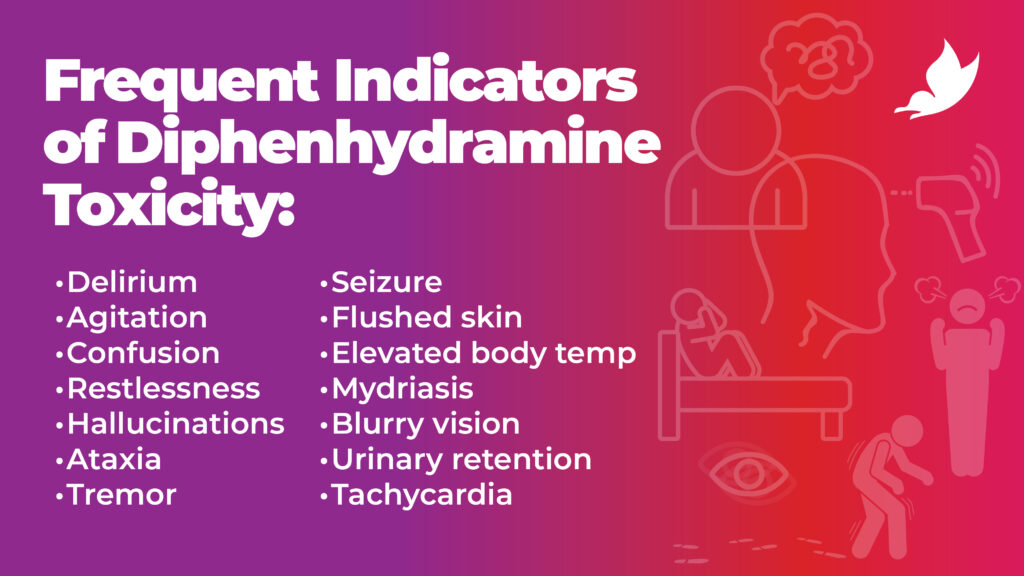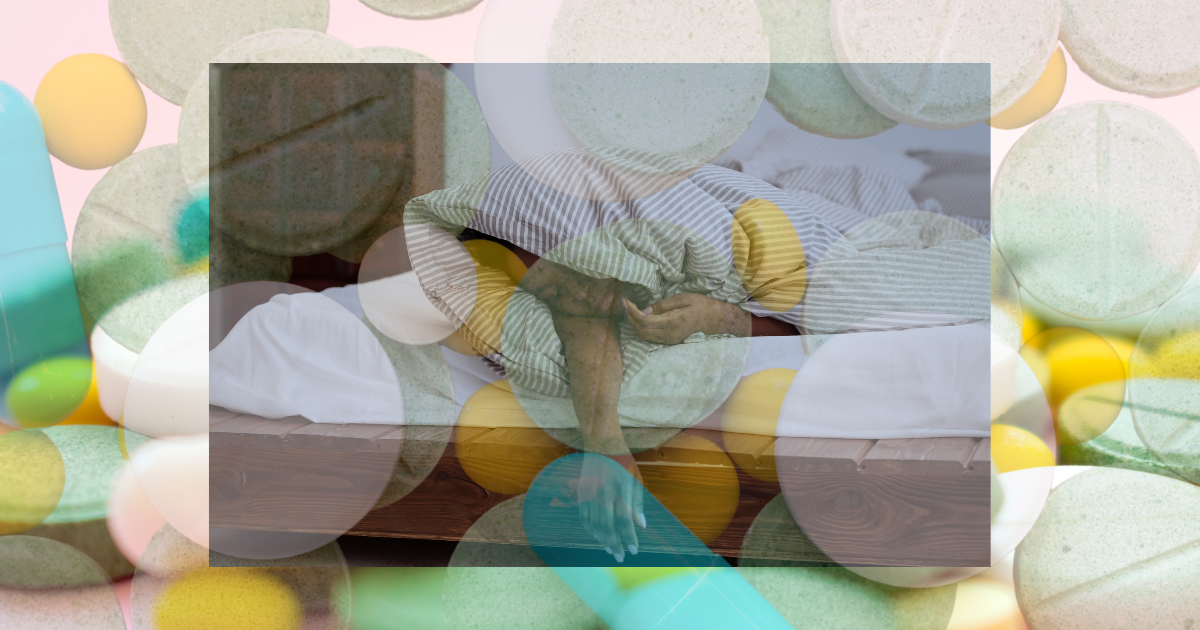Yes, you can take both Benadryl and melatonin together for their individually intended purposes, but be mindful of extreme drowsiness and dosage. In particular, Benadryl (diphenhydramine or DPH) can be easily abused if you take too much. Too many Benadryl pills can cause severe side effects in users and can even cause permanent dementia-like symptoms in those who abuse them over a long period.
What are Benadryl and Melatonin?
As we navigate our daily lives, sleep can sometimes elude us. Whether it’s due to stress, anxiety, or a medical condition, sleep is vital for overall health and wellbeing. Two common over-the-counter aids that people turn to are Benadryl, an antihistamine, and melatonin, a hormone that helps regulate sleep.
But is it safe to take both of these simultaneously?
Understanding Benadryl
Benadryl is a brand name for diphenhydramine, an antihistamine often used to treat allergy symptoms. It has a sedative effect that can help individuals fall asleep. However, it also has potential side effects like:
- Dizziness
- Dry mouth
- Constipation
Read about the recent rise of the Benadryl Challenge on our blog.
Understanding Melatonin
Melatonin is a hormone produced naturally by the body. Its primary function is to regulate sleep patterns. Supplements of melatonin are widely used to address sleep disorders like insomnia. Unlike Benadryl, melatonin usually has milder side effects such as headaches and dizziness.
Can You Take Benadryl and Melatonin?
Generally, Benadryl and melatonin can be taken together, but it’s not always recommended. Here’s why:
- Increased Sedation: Both substances have sedative properties. Combining them may cause excessive drowsiness, leading to potential risks, especially if driving or operating heavy machinery.
- Possible Interactions: There may be unexpected interactions between the two substances that are not yet fully understood. Always consult a healthcare provider to assess your unique situation.
- Individual Needs: Everyone’s body reacts differently to medications and supplements. While some people may find the combination helpful, others might experience uncomfortable side effects.
Why Do Benadryl and Melatonin Make You Sleepy?
Both substances are known for their sleep-inducing effects, but they achieve this through different mechanisms. Benadryl and melatonin make you sleepy through distinct pathways. The former acts as an antihistamine, directly promoting drowsiness, while the latter works more subtly by aligning with the body’s natural sleep-wake rhythm.

Benadryl
- Antihistamine Effect: Benadryl, or diphenhydramine, is an antihistamine. Histamine is a chemical that the body releases during allergic reactions and plays a role in wakefulness. By blocking histamine receptors, Benadryl reduces alertness and promotes sleepiness.
- Sedative Properties: The sedative effect of Benadryl is not just a side effect; it’s often used intentionally to help people fall asleep, especially when dealing with conditions like insomnia.
- Effect on the Central Nervous System: Benadryl can depress the central nervous system, leading to drowsiness and relaxation. This can make it easier to fall asleep but may also lead to other side effects like dizziness or dry mouth.
Melatonin
- Natural Sleep Hormone: Melatonin is a hormone produced naturally in the brain’s pineal gland. Its production is influenced by the body’s internal clock, rising in the evening and falling in the morning.
- Regulates Sleep-Wake Cycle: Melatonin helps signal to the body that it’s time to rest. It doesn’t force sleep but rather promotes the body’s natural inclination to sleep at the right time.
- Sensitivity to Light: The production of melatonin is affected by light. Darkness triggers its release, signaling to the body that it’s time to wind down, while exposure to light in the evening can inhibit this signal.
Recommendations
If you are considering taking Benadryl and melatonin together, it is wise to consult with a healthcare provider. A medical professional can assess your needs and medical history, providing tailored guidance to your situation.
5 Valuable Ways to Sleep Better Without Sleep Aids
Sleep is crucial for overall health, and while medications and supplements can be helpful, there are also natural ways to promote restful sleep. Here’s a look at some strategies:
- Establish a Routine: Going to bed and waking up simultaneously each day helps regulate your body’s internal clock.
- Create a Comfortable Sleep Environment: A cool, dark, and quiet room can make a significant difference. Invest in comfortable bedding and remove any distractions.
- Mind Your Diet: Avoiding caffeine, alcohol, and heavy meals close to bedtime can help you fall asleep faster.
- Incorporate Relaxation Techniques: Practices like deep breathing, meditation, or gentle stretching can calm the mind and prepare the body for sleep.
- Avoid Electronic Devices Before Bed: The blue light emitted by phones, tablets, and computers can disrupt melatonin production, affecting sleep quality.
The Relationship Between Sleep and Recovery
In addiction recovery, sleep is critical in boosting physical and mental health. Here’s how:
- Physical Restoration: Adequate sleep allows the body to heal and repair itself. This restoration is vital for those in recovery, as substances may have taken a physical toll on the body.
- Mental Health Support: Lack of sleep can contribute to anxiety and depression, which may exacerbate challenges in recovery. A healthy sleep pattern helps in maintaining emotional equilibrium.
- Improving Cognitive Functions: Sleep enhances cognitive abilities like memory, decision-making, and problem-solving, all of which are essential in managing life without substances.
- Strengthening the Immune System: Sleep bolsters the immune system, helping to fend off illnesses that can be particularly taxing for those in the recovery process.
- Connection with Treatment: Therapists can integrate treatments such as Cognitive Behavioral Therapy for Insomnia (CBT-I) into addiction recovery programs, addressing sleep issues alongside addiction treatment.
In summary, sleep is more than just a time to rest. It is a critical component of physical and mental health and is particularly vital for those on the journey to recovery. Attention to sleep quality and habits can enhance the overall effectiveness of addiction treatment, supporting a healthier and more sustainable recovery path.
Making Informed Choices for Restful Sleep
While taking Benadryl and melatonin together might be tempting to ensure a good night’s sleep, it’s essential to approach this decision cautiously. By understanding the properties of both substances and seeking professional guidance, you can make an informed decision that is best for your overall well-being.
Need Help with Recovery?
Professional assistance might be necessary if your sleep issues are related to addiction or the recovery process. At Landmark Recovery, we offer personalized treatment programs to help you on your path to recovery. Call us today at 888-448-0302 to speak with a compassionate Patient Navigator who can help guide you through your recovery journey.

Choose Recovery Over Addiction
We're here 24/7 to help you get the care you need to live life on your terms, without drugs or alcohol. Talk to our recovery specialists today and learn about our integrated treatment programs.




